34 Public Displays of Affection That Straight People Take for Granted
06/29/16
By continuing to use our site, you agree to our Privacy Policy and Terms of Use.

Straight people may never fully understand the bravery it takes to be an out LGBT person, because their relationships are recognized and affirmed with every TV ad, romantic comedy, and Top 40 hit. LGBT people have to fight for representation and carve out spaces where “two men kissing” is not a frightening image but a celebrated one. In the face of sexual oppression and antigay violence, fearmongering and queer erasure, our public displays of affection are acts of revolt.
Browse these 34 PDAs that straight people take for granted, many of which still come with safety concerns for many people in the LGBT community. Those of us who are able should engage in them as much as possible, now more than ever. Show the world the power of #TwoMenKissing. Love each other, and dance all night.
Author ALEX CHEVES encourages you to leave your own suggestions for sex and dating topics in the comments. Hungry for more? Follow him on Twitter @BadAlexCheves and visit his blog, The Beastly Ex-Boyfriend.

You’ve probably seen it: two gay men holding hands at a theme park, walking briskly, with rigid arms and cold expressions. They almost seem like militants, cutting through the crowd, matching stride, never cracking a smile.
“Look at the joyless couple,” a friend and fellow homo said, nodding at one such couple the last time I was at Disney World. Whenever I see one of these “joyless couples,” I feel like crying or cheering or screaming or some variation of the three. They are usually young. This may be the first time they have ever held hands in public, and they are determined to do it, goddamn it — but they’re scared.
Their body language betrays their fear. Other gay men spot it easily because we have all been there. I have been there. My first time holding a man’s hand was at a theme park, and I could hardly breathe. My palms were sweating, and after a few minutes I let go. Almost immediately I felt angry at myself for being unable to last longer. Around me, straight couples were walking by, fingers interlocked. It seemed so effortless for them, so comfortable. Why was I so terrified?
The wrongness and unfairness I felt in that moment was heteronormativity and gay oppression. These words might seem academic and sing of protest, but they describe very real problems. As gay men, we are taught to fear public displays of affection from day one — because the little animated boy dog falls in love with a girl dog; because Spider-Man swoops down to save Mary Jane, not John; and because, in the first story I was ever told, God created Adam and Eve, not … well, you know the rest.
Above: Real-life couple (and friends of the author) Norge (left) and Jeramy (right) consented to taking cute couple pictures at various locations across Atlanta, Ga.

When I was a freshman in high school, I tried out for varsity football. One other boy in my class tried out with me. Since our school was tiny and our team terrible, we both made it.
As freshmen, we were at the very bottom of the pecking order and tasked with duties no one else wanted (cleaning the bathrooms, carrying the water). He would become the first person I ever came out to, and today he is one of my strongest allies. He is one of the few friends I can call at any time, even if months have passed since we last spoke, and talk for hours.
I will never forget the day many years ago when we went to the movies and he said we had to leave an empty seat between us. I didn’t understand, so he clarified: “I’m not gay. Straight guys don’t sit beside each other in a dark theater.”
It was a rule I didn’t know, and I instantly started scanning through all the movies I had ever seen with friends, worried that I might have slipped up at some point and given myself away. When I finally came out of the closet a few years later and went on movie dates with guys I liked, I was scared to sit directly next to them, and I repeatedly looked over my shoulder to see if anyone in the theater noticed us sitting together.
Today, I sit in the front row. I will hold your hand and snog you and pull your arm around me. And if you’re straight, I will squeeze your forearm all the tighter in the scary parts — my best friend will attest to that.
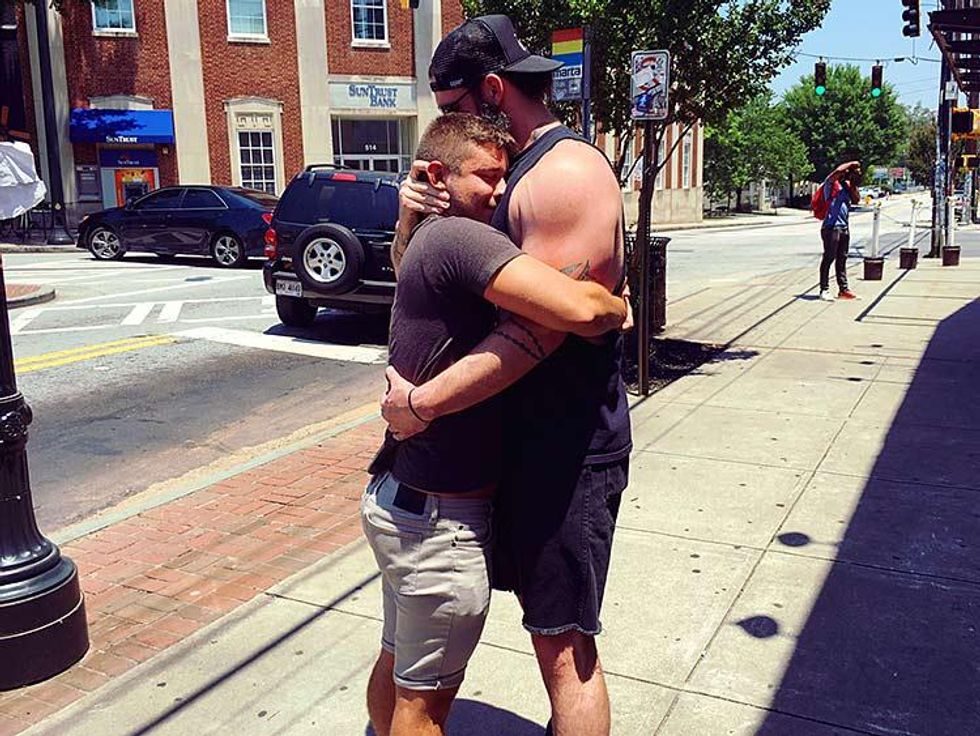
Hugging is generally considered a platonic, nonromantic sign of affection, one acceptable for friends and family — unless you’re gay and in the closet and faced with the task of hugging a handsome guy.
He goes in for the embrace, and suddenly you are flustered and sweating and engaging in something very intimate, almost carnal. Hugging becomes the pinnacle of raw animal attraction. Is this even legal?
Then he lets go.
Hugging is a sign of affection that, in the world of heteronormativity, is a minefield of emotions for gay men. “Bro hugging” is acceptable if you’re straight, but if you’re gay — maybe we should just shake hands.
When gay men hug, we typically kiss each other on the cheek. This is a beautiful practice that says, “What we do is different. This is love.” It is an added layer of intimacy reserved for our brothers who survived the closet and made it to this place in our lives when we can hug and kiss other men freely and without shame.
Above: Beastly (on left, also known as Alexander Cheves, the author) and Mountain (Matt) hug in East Atlanta Village.
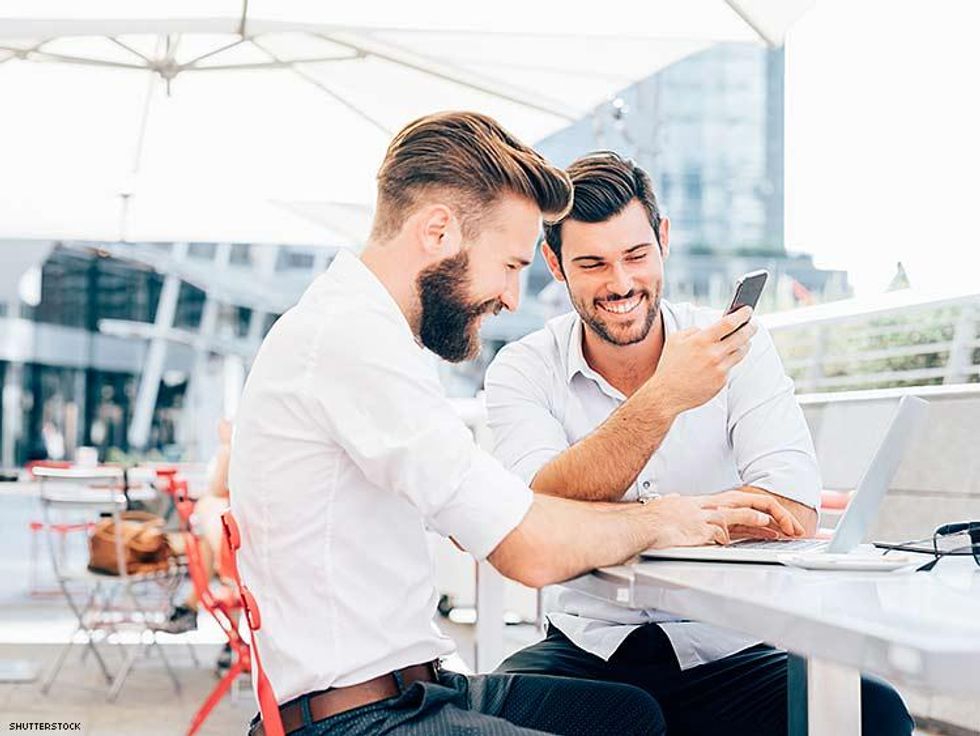
A gay dinner date includes a host of concerns that straight people simply do not have to worry about. Will the waiter be homophobic? Is the restaurant gay-friendly?
When you’re finally there, sitting across from him and gazing into his eyes over the steak tartare, you might be getting attention, positive or negative, from other diners over the simple fact that you’re both men.
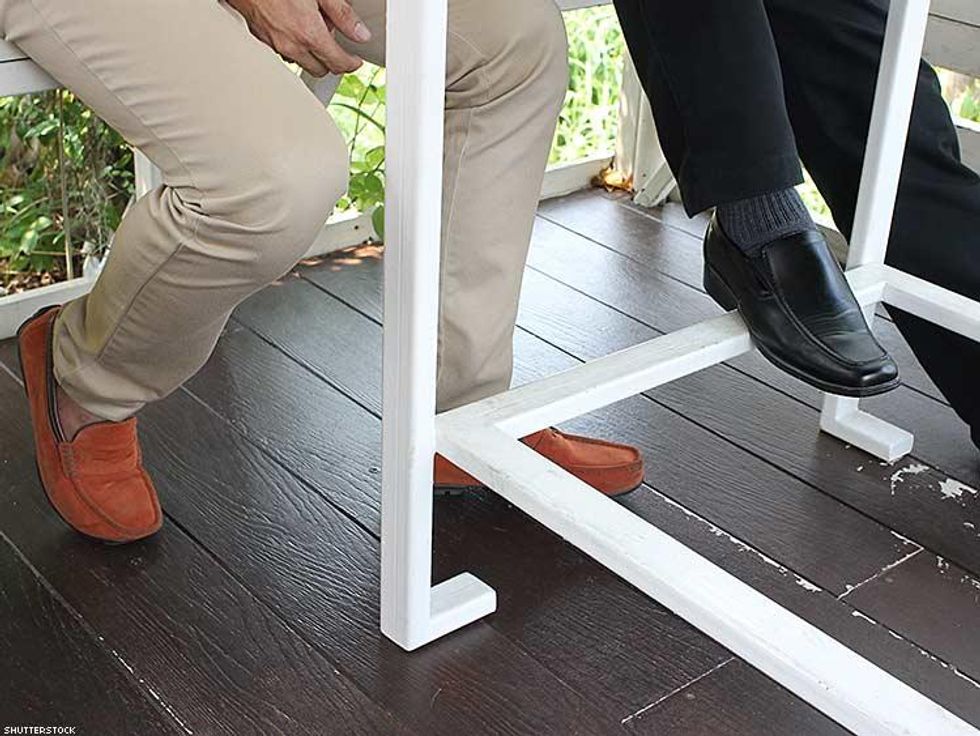
I see straight people doing this all the time without ever drawing attention. But as with all PDAs, when same-sex couples follow suit, there always seems to be someone who thinks it vulgar, as if rubbing ankles constitutes a form of sexual foreplay (which, truthfully, it might be for some people).
Footsie is a sweet PDA typically practiced for its discretion. You can toe his calf during the lively political debate at the dinner table where your friends and family are gathered. Doing so says, “I got you. We’ll get through this. P.S. you’re really hot.” Just make sure you’re toeing the right calf.

Nothing is sweeter than fixing your boyfriend’s hair on the way into a party or out of the house. Even if his hair doesn’t need it, doing so tells him you are looking out for him. He will probably pull away like I used to as a teenager when my mother fixed my hair, but he will appreciate the touch. One thing all single guys will tell you: the smallest signs of affection are the ones you miss the most, the ones that might be overlooked if you are not paying attention.

Then there is the brotherly, playful act of messing up his hair, which might annoy the piss out of him. You are allowed to annoy your partner from time to time.

Stray eyelashes are only fixable with someone else’s help, so if you cannot find any other reason to be in close proximity with other sexy people, this is a good one.
There is always some intimacy involved in the act of touching someone else, even if you are simply wiping away a hair or eyelash. This is the reason I know many straight guys who would rather you leave the eyelash where it is than touch them. When two men touch, even platonically, and even if they are both straight, the hetero world whispers “gay, gay, gay.”

This is another much-appreciated sign of affection that really can only be done by someone else. The reasons to get close to people are endless.
Above: Beastly (left, also known as author Alexander Cheves) chose his friend Jeremy (right), the least physically affectionate gay man he could find, to take these PDA pictures with.

Don’t think this is a PDA? Here’s a story: Before I came out, I seemed to be the only guy in my high school who could properly tie a necktie in a Windsor knot. So when the other three guys in my quartet were hopelessly struggling over their blue-and-white striped ties before performances, I was there. And when the football team had to make dressy appearances, I was straightening and tying ties left and right.
But after I came out? “No thanks, man, I got it.”
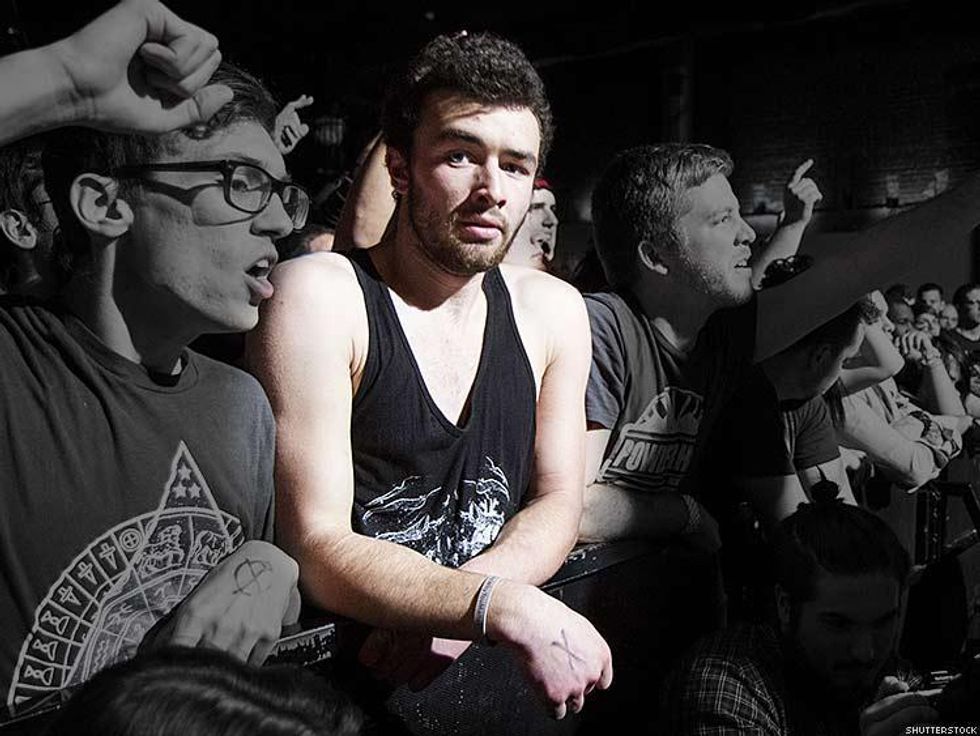
Down-low gay men will not look at each other. Doing so requires them to mutually face a terrifying truth: “You’re one of them, and so am I. We’re the same.”
When you come out, one of the greatest pleasures in life is “making eyes” at a guy. Some gay men would call this “cruising.”
“Making eyes” is a giveaway PDA: It is easy for others to notice you doing it, particularly if he is “making eyes” back at you, and doing so can make you (and him) targets of homophobia.
This is a PDA that straight people take for granted because we live in a world where straight men get away daily with catcalling straight women and eyeing them like objects, but when I undress straight men with my eyes and catcall them (something I absolutely love doing, especially if they’re conservative), I risk getting beaten up — or worse.

Nose pecks are super intimate and kind of silly — especially if you make little squeaky noises when you give them, as I do.

As I mentioned with hugging earlier, gay men kiss on the cheek. It took me a while to learn this and become comfortable with it because I’m American. If I had grown up in France, kissing would feel as natural to me as shaking hands.
Outside the gay world, you will be hard pressed to find a straight man comfortable with cheek kisses, and I admittedly do not kiss or hug women without them making the first move.
I have these rules in place because (a) gay men are somewhat notorious for disrespecting the personal boundaries of women, (b) men in general are notorious for disrespecting the personal boundaries of women, and (c) I am admittedly less comfortable around women and less certain of how my body should behave. I don’t know how hard to squeeze or how long to hold. Women intrinsically make me feel docile and submissive — you should see how I get around dominatrixes — so I always let them take charge when it comes to social greetings and PDAs.

Introducing someone as your significant other is perhaps the most powerful public display of affection. A gay man saying “This is my husband” might seem like a small thing, but it is the result of a hard-won victory following a fight that lasted for years.

A somewhat riskier PDA, if only because your partner might need a mint.

There always seem to be bits of lint on my butt.

A straight friend once told me that “bro code,” which might be the stupidest thing I have ever heard of, dictates that two straight men do not sit next to each other at a bar.
I think this is absolutely absurd. I have sat next to dozens of straight men at bars (some of them were no longer straight by the end of the night) and I have never been told to move over one seat. A movie theater is one thing. It’s dark, romantic, and practically begging for a make-out. But a bar?
Sitting beside someone, wherever you are, seems to be a PDA that straight couples simply get away with everywhere. But a same-sex couple? Not so much.

One of the nicest things someone can do for you is go grab the car when it’s pouring out. They are choosing to get soaked so you don’t have to. It’s a sign of affection that is deeply appreciated by its recipient. If I went and fetched the car for a boyfriend — or, better yet, if a boyfriend went and fetched the car for me — while one of us waited in the portico of a Southern Baptist church following a service (heaven knows why we would have been there in the first place), we might draw attention.

I’m Southern by birth and both of my parents grew up in the Bible Belt, which means I was taught from an early age to hold doors open for women. It’s a sign of respect and courtesy that simply doesn’t fly as easily in Los Angeles or New York. Politeness in these places seems something like a sexual come-on or a sign of social ineptitude.
Growing up, my dad was very clear: You hold the door open only for women, not men. Hold the door open for a man, and you’re a homo.
Well, I am a homo, so I always try to hold the door open for guys I’m interested in. It is a chivalrous and old-fashioned and totally unnecessary PDA, but one I choose to do.

When I lived in Zambia as a child, it was common to see two men holding hands as they walked down the street. My father begrudgingly had to explain to me that this was a “culture thing” in Zambia, adding, “The Lord’s work is needed here,” or something like that.
Although most of Africa is extremely antigay and not a good environment for LGBT people to live in (South Africa being something of an exception), it is generally common to see two men walking together and holding hands. It is not a sign of homosexuality, just friendship. In the United States and Europe, by contrast, two men holding hands is perhaps the clearest giveaway that they are in fact gay.

Going to the beach with a significant other is basically one giant public display of affection. I still sometimes marvel at how beaches are even allowed. We spend our lives in clothes and cubicles and then suddenly we are all permitted to strip to bare minimum outfits in the presence of sand and water.
I’m certainly not complaining, but all the PDA that happens at the beach, from sharing a beach towel to sunbathing while holding hands to making out in the waves to having discreet sex in the dunes, can all present safety concerns for gay men that simply don’t exist for straight couples.

Shortly after I came out of the closet, I was at a bar in Athens, Ga. I had pregamed with some friends and snuck in with a fake ID. The girl I was with was hopelessly drunk, and we danced together on the main floor. I had known her all my life, we had grown up together, and with her arms around my neck, we would have kissed, had it not been for a guy at the bar who was “making eyes” at me the whole time.
When I finally mustered up the courage to talk to him, I asked if he wanted to dance. The look on his face changed instantly. He looked at me like I was an idiot. “We can’t. Look around you.” The bar was filled with drunk college kids clinging to each other.
I had never gone up to another man at a bar before, and suddenly I felt ashamed and stupid. It was in that moment that my view of my sexuality changed. The claim that gay and straight people are basically the same and that only our desires are different is one touted by many “post-gay” homos who bristle at the idea of “gay culture” and steer clear of gay bars.
I take a different stance: We are not the same. We have a different set of cultural values, different practices, and different messages that we generate and cultivate, and we have different spaces — gay bars and gay neighborhoods — that we must defend and protect. In queer spaces, straight people are guests and only partially welcome.

This PDA immediately makes me want to cuddle.

If you have never considered IKEA a romantic place, try going there to pick out furniture for your new apartment with your significant other. You two will be resisting the urge to go a round on the build-it-yourself beds with everyone watching by the time you leave. Furniture hunting is always freakishly romantic for me.
Why wouldn’t it be? You are required to look past the tags and picture your life happening on bedding sets that other people have ruffled through. I once fell in love with a marvelous self-standing mirror because I pictured myself on all fours in front of it, getting rammed from behind.
For these reasons, I think it is perfectly natural to get a little flirty and employ a higher amount of PDA when you’re furniture shopping. And if you have to disappear for a few moments behind a kitchenette setup, well, one must do what one must do.
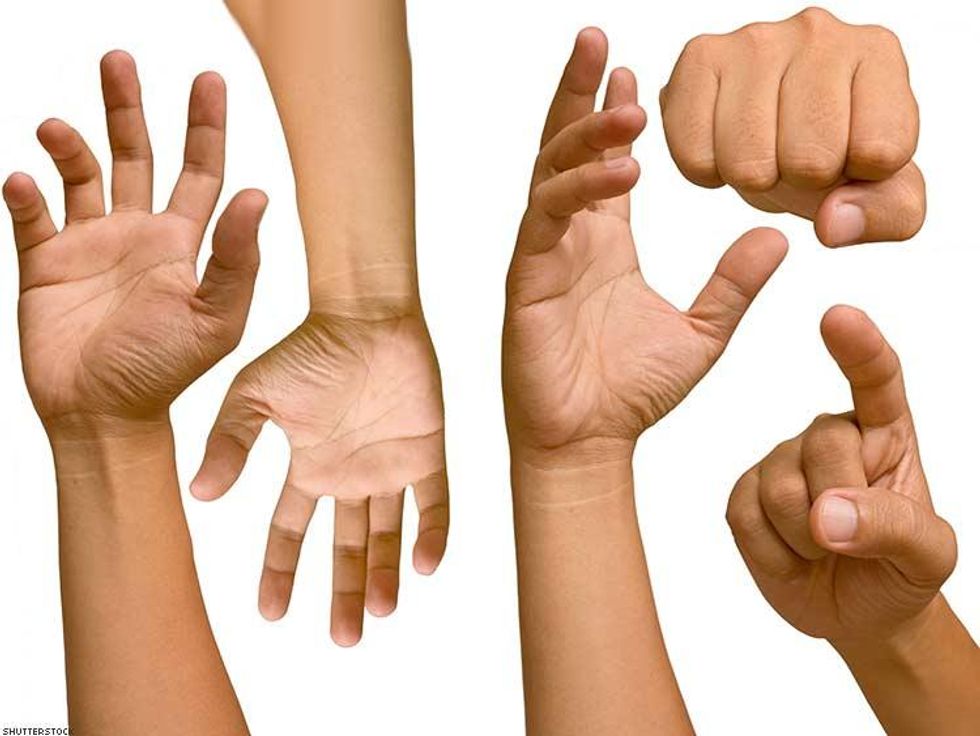
My alpha pup in Atlanta recently taught me the “hand tap signals” that he and his partner and the rest of his leather pack use whenever they’re at a circuit party or in a loud dance warehouse. One tap on the back means “Checking in/I love you.” Two taps means “Are you OK?” Three or more taps in rapid succession means “Help, this guy won’t leave me alone, please save me.”
There are others. Barking, particularly “arfing,” or barking without the “B” sound, strangely enough, means you have taken too much of something — GHB or some other club drug — and are about to spin out, and it is time to go home right now. This is an emergency signal code. Then there are ASL communications: the “I love you” sign, tapping the middle finger and ring finger against the thumb, which means “Woof!” (Rubbing the middle finger and ring finger against the thumb means “Grrrr” — slightly more sexual).
These are discreet forms of communication used when you can’t hear, and are therefore useful tricks for me, since I am deaf in my right ear and can hardly hear anything in a quiet room, let alone a loud one. These are sweet PDAs and very practical ones.

If hunting for furniture is romantic, hunting for a place to put it is downright dirty. PDA level: high. I generally think that it is good to do some PDA when you’re viewing a potential apartment in order to gauge the potential homophobia of your landlord or real estate agent.
In homophobic towns across the Southeast, apartment hunting can present an array of problems for LGBT people. I know at least one friend who rents a two-bedroom apartment even though she and her partner only use one bed. The safety concerns for queer folk become very real: A homophobic landlord spells the possibility of unfair treatment or worse.
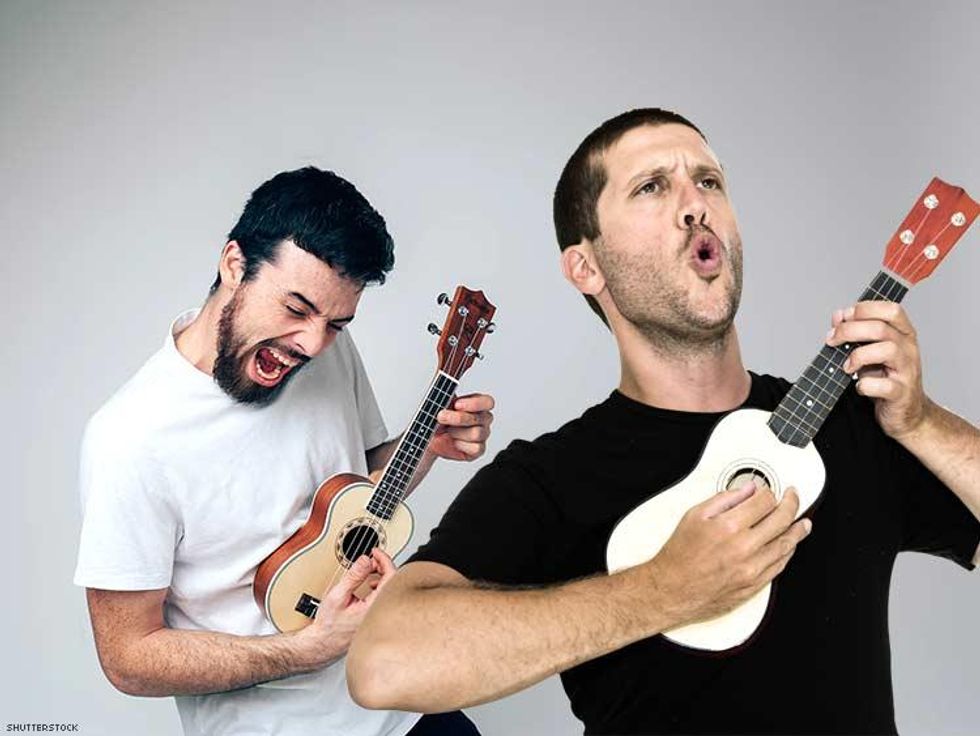
One of my favorite activities to do with the men I love: go to Walmart late at night and cause mayhem.
It’s really quite harmless. I like to go to the toy aisle and play-fight with the array of plastic weapons inevitably hanging there, waiting to incite our children to violence. If there are plastic Batman or Spider-Man masks, those will absolutely be going on our faces. An impromptu photo shoot might be necessary. All this must be done without drawing attention to ourselves from any sales associate, and all the toys must be put back in their proper place, more or less, when we are finished.
Walmart, please don’t sue me.

Whenever I go on vacations with my family (we usually try to get everyone together for a week at the beach once a year), I always buy a souvenir for the guy I’m seeing, assuming I’m seeing someone. And I usually lie to my family about who it’s for.
I will catch myself saying, “This is for a friend” or “This is for me.” There’s no need to lie anymore, but I know I do it because I do not want to see that sudden look of shame flash across my dad’s face. Every time I lie, I feel angry, both at myself and at a world that makes the lie in that moment completely understandable and instinctive. It is cruel that my sister could buy a present for her guy, should she have one, and my parents would help her pick it out and probably send him one from them as well — but my gifts are illicit, bought in secret, and their recipients unknown.
Public displays of affection can happen even when you’re not around your significant other. Buying them gifts and talking to them on the phone are PDAs, and these can present problems to LGBT people who are either in the closet or in unfriendly places — homophobic hometowns, certain countries, etc.

When I have a boyfriend, I get two of everything: two toothpaste tubes, two jugs of milk, double the protein powder, double the pasta. I know how much I eat, and I know how quickly I go through hair products and soap. If I’m dating someone, regardless or whether we live together, there are essentially two of me tearing through my bathroom and kitchen.
Just like calling your partner or buying them gifts, shopping for them can present safety concerns if you’re in a less-than-friendly place where, for different reasons, you might be forced to be discreet. Lies are often necessary.
Straight people might not realize how much of their lives are affected by their relationships, or how much the lives of LGBTQ+ people are affected by ours, yet everywhere that a straight person might feel safe to express signs of their relationship — from wearing their wedding ring to buying extra groceries — we have to always consider the possibility that the cashier hates us.

My mother figured out how to set a special ringtone for when my father calls, and according to my sister, who is home much more frequently than I am, their world has been changed. My father followed suit, setting oldies by Brooks and Dunn for when my mother calls, while my mom prefers Christian pop hits from the early 2000s.
I have never done something as tacky as set a special ringtone for a special someone — that’s what caller ID is for — and since I’m a millennial, I never answer phone calls. But if I was inclined to set a ringtone for a special guy, I would have to explain to the people around me why “Put It in Your Mouth (feat. Kia Jefferies)” by Akinyele or something off the album Eat Me, Drink Me by Marilyn Manson made my heart flutter before answering, “Hey, babe.”

When gay people make dinner reservations, we have one extra concern that our straight counterparts do not: Is the restaurant gay-friendly? Even if your friends have had good experiences at a particular dinner spot, there is always the chance that you can get a first-night waiter who is a raging homophone or religious zealot who refuses to serve you.
I’ve never been refused service because I’m gay, and God help the first business that does so once I return to my computer. But I have friends who have encountered uncomfortable or unfriendly wait staff on what would have been romantic dinners out.
PDA at a romantic dinner is kind of expected: holding hands across the table, those “romantic giggles” I mentioned earlier, loving gazes, and once you’ve downed a couple glasses of wine, maybe even some footsie. If you run a dining establishment and expect to have couples come and sit for a few hours, you must prepare your staff for some of those couples to be gay.

This is an important PDA. When you’re in a hospital waiting room expecting bad news, a hand squeeze is needed, particularly one from the guy you love. The last thing you need in such an environment is to experience homophobia because your person is rubbing your back or holding your hand, yet LGBT people experience this kind of treatment every day, all over the world.

I do not know how many pictures I have taken of straight couples on their shitty phone cameras at theme parks and scenic photo ops, but I do know that one time when I asked a woman walking with her husband and child to take a picture of me and one of my exes — he and I had been kissing the moment before — I was told “No, sorry.”
She looked away uncomfortably while brushing the hair over her kid’s eyes — to draw his attention away from the gays, or perhaps to intentionally keep him from seeing us.
I could have screamed. I was with a guy who was much more mature and kind-hearted than I am, and he held my arm.
Taking a couple’s picture captures the moment of a PDA — a moment when you are both happy, a moment you want to remember. Do not let anyone ruin it. Find the next willing photographer and smile.

Following the Orlando anti-LGBT hate crime, the hashtag #TwoMenKissing has erupted across social media. It is perhaps the most beautiful response I have seen to the tragedy.
Before I came out, years before I would understand the complicated ins and outs of gay culture, the smallest acts of affection meant everything to me: a guy leaning his head on my shoulder during the bus ride home, a male classmate touching my hand.
I sometimes miss the days when a kiss was more than enough. A culture of denial and repression inevitably makes you want more, and this perhaps explains the sexual excesses of gay life, but there is something to be said of the basics: that first kiss and those first innocuous gropings. These are the things we build the rest of our lives on.
I do not lie awake at night remembering the sex I had with my exes. I remember their kisses, how their mouths felt, how they smelled. Kissing them has been my greatest joy. I will have many more kisses with many men in my life, and together we will keep defying those who wish to cause us harm and make us stop.
Keep kissing. Never let go.
#OnePulse